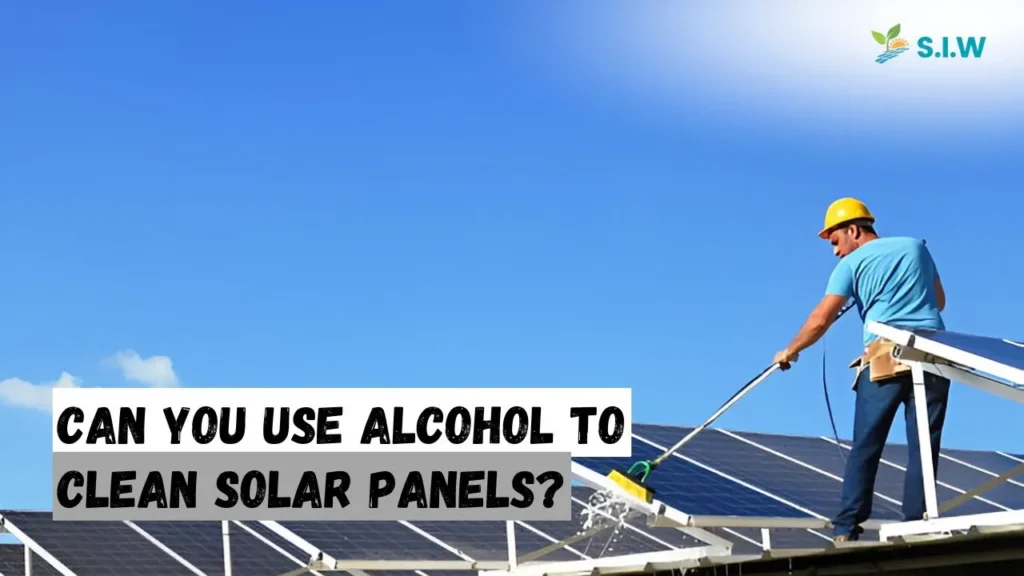Solar panels are a valuable investment, providing clean energy and reducing electricity bills. Keeping them in optimal condition is essential for maximum efficiency, and that involves regular cleaning. A common question arises: can you use alcohol to clean solar panels? This article explores the benefits and risks of using alcohol for this purpose, as well as alternative cleaning methods for maintaining the efficiency and lifespan of solar panels.
Understanding the Importance of Solar Panel Maintenance
Regular solar panel maintenance is crucial to keep them performing efficiently. Dust, bird droppings, pollen, and other debris can accumulate on the panels’ surface, reducing their ability to absorb sunlight and generate electricity. By cleaning the panels, we ensure they function optimally, generating the maximum amount of power.
Is Alcohol Safe for Cleaning Solar Panels?
Properties of Alcohol as a Cleaning Agent
Alcohol, specifically isopropyl alcohol, is known for its quick evaporation and powerful cleaning capabilities. It effectively removes grease, oils, and other residues without leaving streaks or residue. However, its application on solar panels requires caution, as solar panels have delicate surfaces that may be sensitive to harsh chemicals.
Potential Benefits of Using Alcohol
- Efficient at Removing Grease and Oil: Alcohol cuts through greasy residues effectively, which can be particularly useful if panels are exposed to pollution or oils from nearby industrial sites.
- Quick Drying: Alcohol evaporates faster than water, reducing the risk of water stains or streaks after cleaning.
- Sterilization: Alcohol has antibacterial properties, which may reduce the buildup of organic materials on solar panels.
Risks of Using Alcohol on Solar Panels
Despite the benefits, alcohol can pose risks to the solar panel’s surface and its coatings:
- Potential Damage to Coatings: Many solar panels have anti-reflective coatings or protective layers that enhance light absorption. Alcohol may damage or degrade these coatings over time, leading to decreased efficiency.
- Environmental Concerns: Using alcohol on solar panels can lead to chemical runoff if not used carefully, impacting the surrounding environment.
- Cost Consideration: Regular use of alcohol for cleaning may be costlier than using water or other cleaning agents designed specifically for solar panels.
Best Practices for Cleaning Solar Panels Safely
Recommended Tools and Techniques
- Soft Brushes and Cloths: Use a non-abrasive brush or soft cloth to gently remove dirt and debris from the panels.
- Water and Mild Soap Solution: For general cleaning, a mixture of water and a mild, non-abrasive soap is typically sufficient.
- Deionized Water: Using deionized or distilled water reduces the risk of water spots or mineral deposits on the panels.
- Squeegee with Soft Rubber: For areas with heavy dirt accumulation, a squeegee can help remove residues without scratching the surface.
Cleaning Process
- Turn Off the System: Always ensure that the solar panel system is turned off before beginning any cleaning.
- Rinse Panels First: Use a hose or gentle spray to rinse off loose dirt and dust before applying any cleaning solution.
- Apply Soap Solution: Use a mixture of water and mild soap for cleaning. Avoid harsh chemicals or abrasive materials.
- Rinse Thoroughly: Ensure that all soap is rinsed off to prevent streaking or residue.
- Allow to Dry Naturally: If possible, allow the panels to air-dry or gently use a soft cloth for a streak-free finish.
How Often Should Solar Panels Be Cleaned?
The frequency of cleaning depends on the local environment. In areas with high dust, pollen, or pollution levels, solar panels may require cleaning every 2-3 months. In cleaner environments, an annual cleaning may be sufficient.
Alternative Methods to Clean Solar Panels
- Automated Cleaning Systems: Some companies offer automated cleaning solutions designed to clean solar panels without manual effort.
- Electrostatic Cleaning: This method uses electrostatic charges to repel dust and dirt from the solar panels, reducing the need for frequent cleaning.
- Rainwater Harvesting: In areas with regular rainfall, rainwater can naturally help keep solar panels clean. However, areas with less precipitation may still require manual cleaning.
FAQs
1. Can I Use Alcohol to Clean Solar Panels?
While alcohol can be effective in removing grease, it is generally not recommended for routine cleaning. Regular exposure to alcohol may degrade the panel’s protective coatings, potentially reducing its efficiency over time.
2. What is the Best Way to Clean Solar Panels?
Using a mild soap and water solution with a soft brush or cloth is the safest and most effective way to clean solar panels. This method removes dirt without causing damage to the panels.
3. How Often Should Solar Panels Be Cleaned?
The frequency of cleaning depends on environmental factors, but every 2-3 months is typically recommended in areas with high dust or pollution.
4. Are There Professional Solar Panel Cleaning Services?
Yes, many companies offer specialized cleaning services for solar panels. Professional services may use equipment and techniques designed to clean panels safely and efficiently, which can be beneficial for large installations.
5. Can Dirty Solar Panels Affect Energy Production?
Yes, dirty solar panels can significantly reduce energy output. Studies indicate that panels with significant dirt buildup can lose 20-30% of their efficiency.








